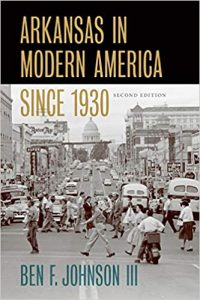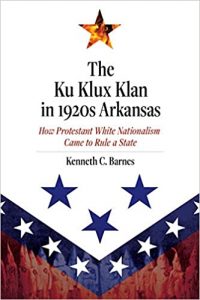calsfoundation@cals.org
A Complex Aroma for the Digital World
I should have read the second edition of Arkansas in Modern America Since 1930 by Ben F. Johnson III back in 2019, when it was released. But having a few book projects of my own in the works at the time, and then having to deal with a worldwide pandemic that greatly increased the amount of time devoted to my adjunct teaching gig, I didn’t catch up to it until recently. And then, when I finally finished that book, Kenneth C. Barnes’s new work, The Ku Klux Klan in 1920s Arkansas: How Protestant White Nationalism Came to Rule a State, showed up at my door, and I just dove into that, finishing it up in one day.
Reading both books, I found that they shared a certain quality, despite covering different subject matters and time periods. And that quality is probably best summarized by that adjective we like to apply to very expensive coffee: complex.
What I mean by this is that both volumes exhibited a level of detail that would have been difficult to achieve just a few years back. I was most struck by this fact reading Barnes’s book, for it covers some of the same time period I covered in my 2010 doctoral dissertation. When I was doing my research and writing for that project, digitized newspapers were still in their infancy, with Chronicling America, the largest such project, having only begun in 2005, and it had no Arkansas newspapers until fairly recently. So when I was doing my research, I had to sit myself before a microfilm reader and crank through the issues, hoping I didn’t miss something vital by the second hour when my eyes were starting to blur.
However, since then, more and more newspapers have been digitized, complete with keyword search capabilities. Aside from Chronicling America, on-site patrons of both the Central Arkansas Library System and the Arkansas State Archives can access certain state newspapers for free through Newspapers.com. Users can now do keyword searches and find material from all across the state. Barnes cites events occurring in Hazen, Fouke, Hot Springs, Mena, Mountain Home, and many more places. It’s a level of local detail I’ve not seen in other studies of the Klan, and the author himself notes in the acknowledgments, “I have benefited enormously from the digitization of the Arkansas Gazette, Arkansas Democrat, and many other newspapers. Digital searches not only make the work easier, but they provide access to information that would otherwise be easily missed.”
Likewise, Ben Johnson III cites two important digital resources as being crucial to his own work: the CALS Encyclopedia of Arkansas and the David and Barbara Pryor Center for Arkansas Oral and Visual History. The latter, on my reading, seems particularly important, giving his book a more direct engagement with the people who lived this history than is typical for broad overview works. To be honest, I normally find those history books that offer the story of a state over a span of years rather dull compared to more thematically focused works, but Johnson’s book stayed engaging from start to finish, precisely because he included the voices of journalists, legislators, businessmen, and average citizens all the way through.
Maybe what we are seeing is the start of a virtuous feedback loop in the field of history. As we offer more digital resources (and you can find many of ours through the Arkansas Studies Research Portal), we make it possible for more people to do history and for those same researchers to do better and more detailed history. And the work they turn out, by more authoritatively speaking to the reality of our state (as well as other subjects), might get more people excited about our past, thus driving an interest in those available digital resources, and so on, and so on.
Complex is a good word to describe these books—and, no doubt, the works of future historians down the line. The word conveys a sense of the nuances that are possible with a careful attention to detail in the production process. As more people take an interest, our history, just like our coffee, is becoming better and better.
By Guy Lancaster, editor of the CALS Encyclopedia of Arkansas






